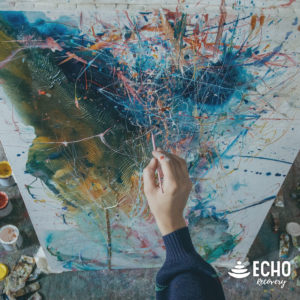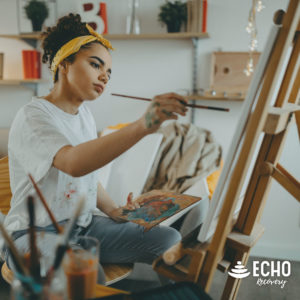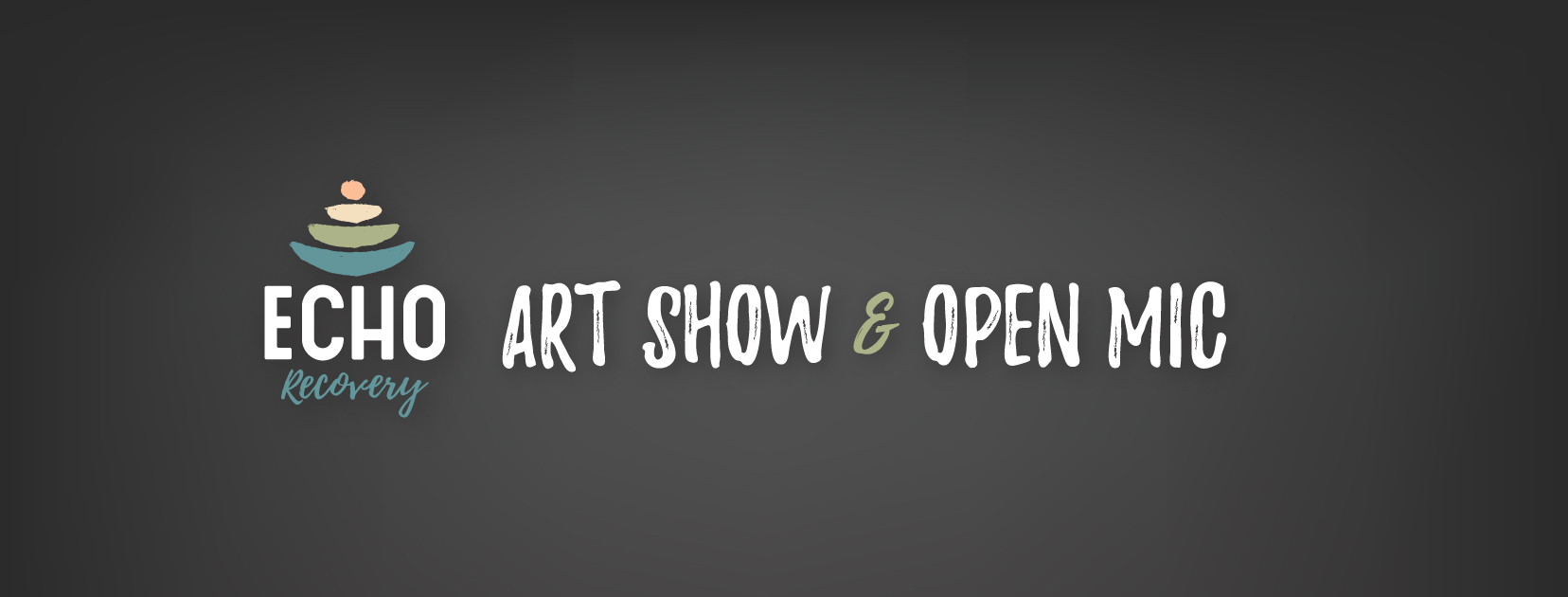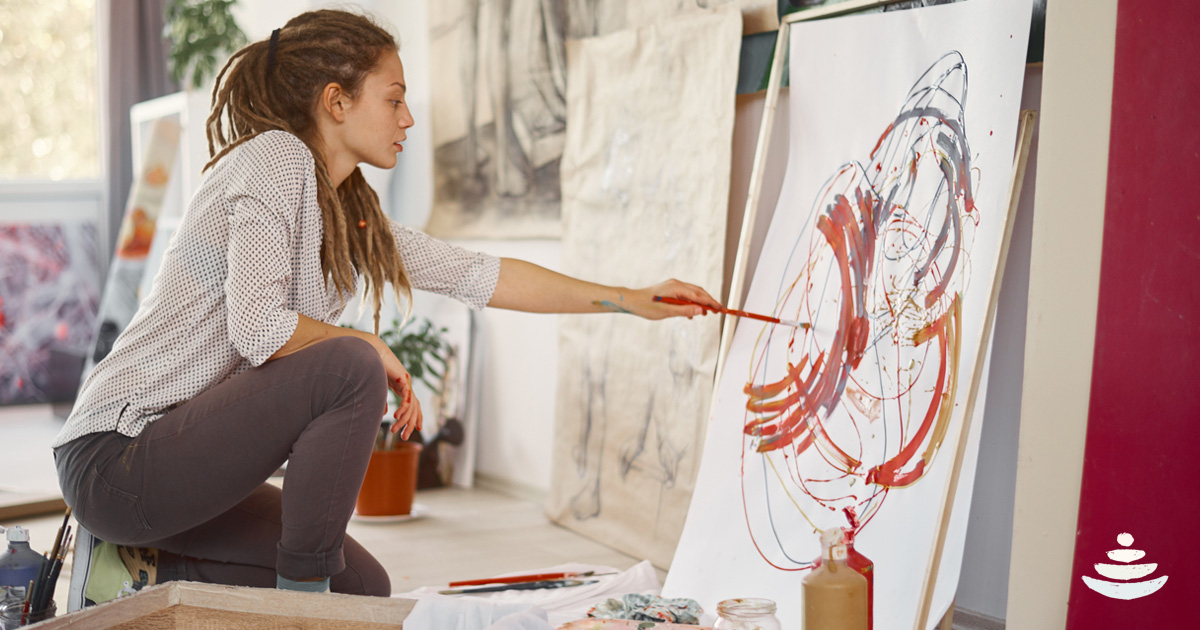When we started the ECHO Foundation in 2014, our mission was to provide housing support for those in recovery and beyond. This meant fundraising and asking for donations in order to provide scholarships for sober housing and things like basic necessities to individuals who need financial support while in long-term recovery and while in transitional care.
As a non-profit we rely on donations, and without a major grant or big donor, our cause is solely supported by our Board of Directors. We realized with time that supporting local sober housing and providing scholarships would required a lot more financial donations. So we brainstormed other creative ways we could still support the addiction recovery and sober community, but could give back in other ways.
Art for Recovery Was Born
Art moves us and allows us to make sense of the world around us. It gives dimension and color to our lives, and can teach us in different ways. Art can be a powerful way to connect with humanity. It is one of the most expressive forms of communication.
As a tool for those struggling with a mental health or substance use disorder, art can be a way to express trauma, pain and emotions in an entirely new way.
For those who struggle with drug or alcohol abuse, often times their initial use started as a form of self medication. As a way to deal or cope with pain. Unfortunately, numbing thoughts and emotions might seem to work for a while, but we all know trauma requires work to face and overcome, and often times the individual needs professional care in order to identify the issue and address the cause at the root.
Self-medicating is never a means to an end. It’s always a temporary “fix” and often has dire consequences.
So, why are more people not seeking professional care for their addictions and mental health concerns?
There are many reasons why individuals don’t seek help, some are:
- Stigma – with so many built in stereotypes and misconceptions around mental health issues, the stigmas are deeply rooted in our society and culture. Event the media depicts substance abuse in a way that causes those that struggle with it to feel shame and embarrassment, making it hard to speak up and ask for help!
- Financial – we all know that healthcare in America is expensive. Even those that can afford a decent health insurance plan find themselves unable to afford expensive out-of-pocket costs, especially when it comes to mental health care which often times isn’t even covered by the provider. A private addiction treatment facility can charge $20-50K per month. No wonder so many think they simply can’t afford care!
- Accessibility – in metropolitan areas you might find several treatment centers offering varying levels of care right in your own zip code. However, for many in more rural areas, the right care just isn’t available to them in their own town. Someone who needs outpatient care might find themselves driving an hour for a one our class or meeting, hardly practical for someone who also needs to take care of life outside of care.
- Misinformation – beyond the misconceptions that still create so much stigma today, a lot of misinformation exists in outdated texts and old websites and blogs that cared more about using marketing messaging to get more leads than actually educate their users with legitimate information and resources. It’s no surprise people are confused about substance use disorder and how and when to get care when sleezy marketers have controlled the narrative for so long.
- Lack of support – let’s be honest, deciding to enter care is HARD. It’s a big commitment both financially and mentally. I can’t even imagine someone in active addiction being able to lift themselves out of the fog long enough to make the choice to go to rehab without some sort of support. Sure, the individual has to want to go to care, but they also need family, friends, a counselor – someone to care about them, listen to their concerns and support them on their journey. Not everyone has that.
Art and Mental Health
As you can see, in today’s society, there is a heightened risk of mental health decay due to the onslaught of negative social impressions, spread by entertainment media and viral visibility social platforms create. For those who want to remove drug and alcohol dependency from their lives will find that, even after treatment, maintaining their mental health and avoiding triggers is a challenging, ongoing task.
Never has it been more important to spread awareness about the importance of mental health and advocate for more tools to not only help those in recovery, but their families, loved ones and the communities they live in.
Art is a way to way to reconnect with old passions or even discover new talents we didn’t even know we had. And, perhaps even more importantly, art therapy helps the individual find new ways to express their emotions and heal from their past.
How amazing is that?
Addiction Can Happen to Anyone
Many people who have been caught up in drug or alcohol abuse have self-medicated to forget their pain, or, at the very least, numb its impact. Others’ addiction may have been circumstantial. For example, athletes after injury or anyone who had undergone surgery were prescribed opioids to relieve pain. We now know that opioid addiction can occur in as little as five days of use. No matter how a person develops a substance use disorder, there are similar results embedded in the process affecting each victim of the disease.

Emotional Response and Rescue
Over time and ongoing toxicity from drug and alcohol intake, emotional balance declines. During active addiction, as well as during the withdrawal process, the body and the brain are desperately trying to reset to homeostasis. But without a proper medical detox, clinical and therapeutic care, true recovery can be a losing battle.
People under the influence of a chemical on a consistent basis will enact inappropriate responses to their environment and social situations. Mood swings, erratic behaviors, and impulsivity are common. Anxiety, depression, and reactive moments are common and may even be the symptoms of post-traumatic-stress disorder.
All of the above are repercussions from the misappropriation of the human “fight or flight” response that drug and alcohol addiction hijacks. As such, an individual can easily overreact to an everyday situation, compounding their problem and making it near impossible for social interaction and the ability to forge healthy relationships.
Exercising creative expression through art is a non-invasive way to put emotions back into place and begin to heal.

Self-Expression in Art Eases the Effects of Trauma
If you were to take a cross-section of people in addiction treatment and pinpoint the exact root cause for their affliction, you’d find that trauma is often the underling issue that lead to the substance abuse in the first place.

Through therapeutic treatments, clients learn how to access their emotions and get more comfortable with them. From there, understanding the why about emotional responses helps to better moderate and manage them when they arise. It’s often a painful and challenging process that fuels negativity and the resurgence of agonizing memories.
By introducing art therapies, often times the individual can take a mental break from the racing and irrational thoughts that present each day and put their emotions into a form that doesn’t always require words. Through a paint brush, ink pen, charcoal pencil or the gentle maneuvering of clay, art becomes the expression of emotions that words cannot explain. In essence, art in process does the talking without speaking a word.
The Inner Voice Needs a Healthy Outlet
People, at our core, are made of energy. Some of us naturally have more energy than others. Endurance athletes are a prime example; stage performers carry similar characteristics. After addiction has taken hold of a person, the connection between owning personal emotions and then communicating them to others is lost. Without a way to deal with emotions, mental health is always in flux and at the mercy of what a person can control or not.
Considering that life is full of the unexpected, having an outlet for emotional expression and an overabundance of energy is vital to overall wellness and avoiding potential triggers for drug relapse.
Art therapy provides a path to connecting with ones inner voice and can be a tool for those who need something to turn or help sustain their sobriety, long after professional treatment has ended.
Discovering Hidden Talents Can Heal
Carrie shares her personal story about growing up with an alcoholic mother:
“I never thought of my mother as an artist. In fact, it was the family on my father’s side that always comprised the creative individuals of my name’s sake. Until I visited my mom while she was doing a 30-day rehab stint some years ago and she shared her paintings with me. Then I realized there was a whole different side of her that I never knew. But the discovery went much deeper than that. She was saying things through her art, telling us stories we had never heard before about her life. It was touching, powerful and eye opening.”
“Art, in itself, is an attempt to bring order out of chaos.” – Stephen Sondheim, American composer
Tweet This
“Her paintings were simple but complex.” Carrie continues, “Looking back on my mother’s art in her own recovery, I believe it was truly representative of who she was as a person and why she was misunderstood. Her relationship with my father was based on her enabling his behaviors, much to the detriment of her self-esteem, personal worth, and the blossoming of any aspirations she may have held.
She was the support network for everyone else. Creativity was left to my father and his work. Mom was never given the opportunity to be heard through artistic self-expression. Until time in addiction rehab for a co-occurring disorder opened the door for her. Seeing her visual impressions on canvass in watercolors that blended haphazardly from left to right, it was bittersweet. I was happy to see her, the artist I never knew existed, yet sad that so much time had lapsed in her life before it came to fruition.”
Art Therapy Encourages Sharing and Expression
Professional Art Therapy for addiction recovery is normally done in a group setting where clients can learn to focus on their work while in the presence of others.
Are Therapy is not limited to painting and drawing, however, there are many forms of art. Some other types of art used therapy are:
- Dance
- Music
- Theater
- Sculpture
- Collaging
- Coloring
- Story writing
- Photography
Art therapy is more than an emotional outlet; it’s a manifestation of a person’s inner being. There’s beauty in that, and often inspires a person to delve further into their artistry, while helping others step outside of the fear of judgment to begin exploring art therapy for themselves.

Why Addiction Treatment Should Include Art
There is science behind the inclusion of art during addiction treatment. An article in Psychology Today points to the following benefits of art therapy that align with human needs during the recovery process:
- Self-expression and learning how to just let life flow
- No judgment or shame
- Reconnecting with self, regulating emotions
- Providing purpose while coping with loss
- Helps with socialization and promotes playfulness
- Empowers other abilities
- Allows personal healing and shared healing
How Art Impacts Community
Beyond the obvious benefits of art for individuals in recovery, it’s obvious all of us could use more art in our lives. Not only could we all benefit from self expression and the therapeutic benefits that come from practicing art, using art as a platform to tell a story is a powerful way to connect with others in the community. Although the conversation around addiction has opened up in recent years, there are still so many who are hiding in the shadows, living with guilt, shame and all of the other stigmas that surround their disease.
By sharing their stories. By giving them a platform. By offering the public a look into the reality of mental health and substance use disorders WE can make a difference.
Through art we can reach people who may have not taken the time to understand the growing issue we have in America around mental health. We can take back the narrative and provide a new way for the public to see how addiction impacts us all.
The ECHO Foundation Supports Artists in Recovery
As ECHO continues our mission to support artists in recovery, we’re working as an organization to further our reach so we can help more people and give back in bigger ways.
In 2019 we started what we thought would be our first ANNUAL ECHO Recovery Art Show and Open Mic Night. And, thanks to ECHO Board Member, Jennifer Nilsson, we did have our first ever ECHO Recovery Art Show!

However, as 2020 took us into isolation and all in-person meetings and events were cancelled, so were our plans to host our second annul show.
Now that things are starting to open back up again we’re hopeful that we can resume our art for recovery show and continue to serve the community through future art focused shows and events.
But, just like so many others, we were forced to look for new ways to connect with those we are here to serve. So, we decided to dive deeper into our online educational tools and resources and reach out to our contacts to ask others to join us in our efforts. In addition to our art for recovery blog posts and stories from artists, we’re working on partnering with artists, teachers and art therapists to create and share art classes online!
We’d love it if you join us in our efforts to support individuals in recovery and help end the stigma around mental health so those that need help can get it. Donate to our cause, Volunteer, or Become a Corporate Sponsor if you want to help us make a difference!
Together we can make an impact and change the way people see and treat mental health issues.
Editors note: We originally published this article on Aug 8, 2019 and decided to republish the post with a new date of June 25, 2021 after editing and updating the content.
Jenny Weatherall is the co-owner and CEO of Eminent SEO, a design and marketing agency founded in 2009. She has worked in the industry since 2005, when she fell in love with digital marketing… and her now husband and partner, Chris. Together they have 6 children and 3 granddaughters.
Jenny has a passion for learning and sharing what she learns. She has researched, written and published hundreds of articles on a wide variety of topics, including: SEO, design, marketing, ethics, business management, sustainability, inclusion, behavioral health, wellness and work-life balance.


